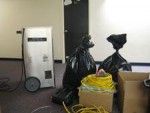Noah Would Be Proud

They say lightning never strikes the same place twice, but apparently the rule doesn’t apply to water. On Thursday, October 11, a fire suppression sprinkler was accidentally activated by a resident of Whitnall House in Cutten Complex, inundating the building’s first and second floors.
According to Director of Campus Safety Gary Bean, half a dozen officers responded to a fire alarm call at 3:30 p.m. At the scene, it was discovered that the alarm was the result of the sprinkler activation and Buildings and Grounds (B&G) personnel were called to help deactivate the sprinkler system. Office of Residential Life personnel also responded to the incident.
“When the staff first got down there [the water] was at least ankle deep,” Director of Residential Life (ResLife) Jennifer Adams, who arrived on scene about twenty minutes after the first alarm, said. “The B&G staff were phenomenal – they moved more water out than I ever thought possible.”
Water flowed from the sprinkler for 10 to 15 minutes before the system was deactivated, which, according to Plumbing Foreperson Tom Kane, meant that somewhere between 2,300 and 3,450 gallons of water entered the building.
“The water pressure on the sprinkler system at Whitnall is 115 [pounds per square inch] and the head that was activated has a half-inch orifice,” Kane said, adding that roughly double the pressure of the system equals the per-minute flow of each sprinkler head. Kane said that the high pressures involved explain why B&G stresses that the sprinklers not be carelessly impacted in any way.
According to Bean and Kane, electricity was also cut in parts of the building immediately after the incident because of fire danger.
Adams explained that the water flowing through the building affected seven student rooms on the first and second floors, as well as the lounges on those floors. Parts of the Whitnall basement were also damaged, especially the drop tile ceiling.
“The poor students on the first floor got hit the worst,” Adams said.
Representatives from several University departments met on Monday morning to assess the situation and determine a course of action. Adams said that residents of Whitnall 108 through 111 and 209 through 211 were asked on Tuesday to move into temporary accommodations in the Class of 1934 House and a Townhouse gateway apartment until Whitnall could be repaired. At press time, the University did not know what those repairs would entail or how quickly they might be completed.
“The main thing with any type of flood is the removal of water,” Director of Environmental Health and Safety Michael Gladle said. “If the water had sat there, [mold] would have been a concern, but that did not happen.”
Gladle and Adams explained that, after B&G staff vacuumed the standing water from the building, industrial-grade dehumidifiers were placed in the affected rooms to help speed the drying process. On Wednesday, B&G staff drilled “breather holes” into the baseboards of the walls to allow the air to circulate behind the drywall panels.
“We are checking moisture levels in hopes of avoiding having to replace drywall and carpet,” Adams said.
As the drying-out process continued this week, affected students were beginning to tally the damage to their belongings.
“I had about an inch of water in my room,” sophomore Geoff Curfman, who lives on the first floor of Whitnall, said. “My roommate and I didn’t lose anything, but people next to us will probably have to replace a lot of their things.”
The final bill for the incident will not be known for some time, but according to Risk Management and Endowment Coordinator Andrew Fagon, no student will bear the financial responsibility for the damages.
“We are fully insured for property damage,” Fagon said.
He was quick to note that, as outlined in Colgate’s Student Handbook, the University’s coverage does not extend to students’ personal property. Fagon encouraged affected students to quickly tally their losses and file claims with either their homeowners’ insurance or their dorm insurance companies. Colgate encourages all students to register for CSI Student Personal Property Protector Plus coverage.
“If absolutely all of the possibilities fail, I think it prudent that the student seek compensation from the University,” Fagon said.



